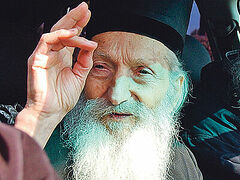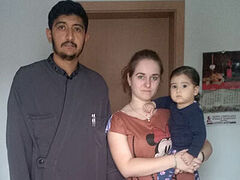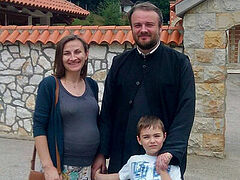The trunk of our car is literally jam-packed with books, and another large bag is purposefully left on the back seat—hoping that we aren’t stopped by the Kosovo police. On our way there, I am pre-occupied with thoughts: here, inside the so-called “independent Kosovo,” you aren’t allowed to call your native land Kosovo and Metohija—you can be fined or even sentenced “for incitement.” It is the same thing if you use the Cyrillic alphabet. You simply can’t use it these days—you should write so that all “decent people” can understand you. We are so used to all kinds of restrictions, limitations, various sanctions, and humiliation. But for some mysterious reasons, we still fight back, we don’t give up and even grow stronger. We will survive anyway. Hello, our beloved Kosovo and Metohija! I feel your gentle power on this ethereal morning in March, and I can’t get enough of your fresh air. The smoke rising from the stovepipes of the local country homes makes the air’s unmatched fragrance that I loved so much since childhood even more intense. Hello, my native Kosovo! I still don’t know where you get all this strength to withstand evil!
Our car stops beside the church in Vitina village. I look at its broken window and an empty space where a Serbian flag was once waving before—the evidence of a recent visit by those “decent people who know nothing about the Cyrillic alphabet.” They have seemingly been coming to the area more often lately to destroy and desecrate the churches. So often that the destruction of the church in Vitina didn’t even show up in the news—like, no big deal! It’s too bad that it didn’t: What if the world were to finally learn at least a little bit about the plight of the Serbs from this village? “Our life revolves around the church and the school,” says a local teacher of the Serbian language. “Life here is like a blank sheet of paper. How good it would be if we could add some other things we could do here!”
 Serbian schoolchildren in Vitina
Serbian schoolchildren in Vitina
Three hundred books by Serbian and Russian writers were gifted to the students and adult readers of the school library
The books (in Cyrillic—our sincere apologies to you, our “civilized” neighbors!), purchased in part through the assistance of readers of pravoslavie.ru in our beloved Russia, were a gift that we delivered to the local school library. Three hundred books by Serbian and Russian writers gifted to school students and adult readers of the school library is the happy end of an “illegal,” in the eyes of the today’s authorities, mission. Undoubtedly, these books will be read—not only by the villagers from Vitina, but also their guests from nearby villages and settlements. Following the war of 1999 and the March pogrom of 2004, only two children come to school from Vitina plus their teacher Dushitsa… But it’s alright; we will persevere.
“Before that horrible pogrom in March 17, 2004, there were many Serbian households in this area,” says Dushitsa. “After the pogrom, many of them became refugees in their native land. Even now, the Serbs who stayed put don’t see any future for their lives in such a hostile environment. I understand it and can’t blame them for that—we have no freedom of movement whatsoever; the Serbian children feel more or less safe only here, beside the church and the school, but later a bus will come to deliver them back to their homes. All in all, there are only twenty-eight kids here—not too much, truth be said. I always, you know, keep thinking of old times, before the war and the pogroms, when the school was located at the very center of the village and we had three to four classes in every grade and about forty kids in every classroom. Yes… All we have left today is two to three children per class. It’s obvious, not much left for the children’s future careers. The only place left in Vitina where the Serbs can find employment is this school were you and I are standing right now. Oh, I’ve got to go, I have a class in a couple of minutes, so, we will finish talking once it’s over,” the teacher suddenly recollected.
A story Dushitsa has shared about her family is, in my opinion, a telling illustration of the fate the Serbs are facing in Vitina and throughout the Kosovo and Metohija in general.
“The majority of the local Serbian families reside next to the church, whereas only our family, plus another elderly teacher, who is practically a beggar, living in extreme poverty, are still residing at the center of Vitina. I remember that day all too well: March 17, 2004. I was nine years old, but I remember everything vividly. What was it like? It was terrifying; the main thing was an all-compassing fear, I think. All of Vitina was ready to run away, while those who had nowhere or no one to run to, locked themselves in their homes and prayed for deliverance from foreign invaders… Ever since then, you can’t say we are living an ordinary or normal life—it has never returned to normal no matter how long ago it happened, but the pain and the shock are still the same. I think once you’ve lived through such a horror in childhood… none of those who were children at the time had a chance to recover—we are still afraid of being alone.
Silence about violence against the Serbs, selective absent-mindedness of the “civilized media” deftly worked in favor of the Albanian extremists prompting formerly benign neighbors to become violent; if evil is intentionally looked over and you aren’t going to be held responsible for anything, then why can’t you, say, “hunt those Serbs” and dispossess them of their land, house, livestock, or a tractor… Not only will you not be prosecuted, you’ll even get a pat on the back. So, go ahead, cut loose…
If evil is intentionally overlooked and you aren’t going to be held responsible for anything, then why can’t you, say, “hunt those Serbs”?
When we were left alone, we never had a single day of peace. Almost daily we had to suffer humiliation, you know, when you are told things like “isn’t it time for you all to leave, who knows what might happen,” etc. About five years ago, we woke up in a cold sweat: stones were flying into our home. They broke the window glass. Not a great night if you lie down expecting a Molotov cocktail to be hurled your way. And what’s most important—you know for sure that not a single soul will come to your defense, there is simply no one left out there. Later on, we found out that they were some teenagers. Probably, some of the local “do-gooders” pointed out two Serbian homes to them. Naturally, everything was hush-hush: “The homes of the Serbs were attacked by strangers.” Not long ago, we had another “pleasant” surprise like that. So, imagine—how can you really have a restful sleep after that in your own home, if such things happen all the time! You can’t, because, as you lie down to sleep, you get no sleep—it’s more like slumber laced with fear,” the teacher says quietly.
She sighed:
“What hurts us most is when you see how the new owners work on your land and you can’t say a word against it. It is the land of your ancestors that fed you, and it taught you how to live in life—that hurts a lot, believe me. But we will persevere, we will.”
I was sitting inside a small and dusty reading hall in the library looking at yet another March 17 passing by in Kosovo and Metohija, the children playing in a school yard the size of an average-sized kitchen, the church’s broken window, the river and the sun above Morava—and it was as if every speck of dust twirling under the rays of the sun was telling me: “But we will persevere anyway!” With the books, the songs, the sun, our inexpressible joy and faith in Christ’s Resurrection—we will persevere!





